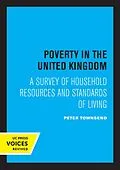Poverty in the United Kingdom: A Survey of Household Resources and Standards of Living by Peter Townsend stands as a landmark study in understanding the breadth and depth of poverty in Britain during the mid-20th century. Grounded in an extensive national survey conducted in 1968-69, Townsend employs rigorous empirical methods to unravel the structural causes of inequality, rather than relying on transient or anecdotal observations. By introducing innovative measures of deprivation and relative inequality, the book not only provides a snapshot of societal disparities but also critiques existing frameworks that inadequately capture the lived experiences of the economically marginalized. The book's findings remain remarkably relevant despite the passage of decades, as Townsend argues that the fundamental social structures sustaining inequality change minimally over time. His analysis traverses key themes such as the distribution of wealth, income, and resources, and he critiques institutional practices that perpetuate socioeconomic divides. Townsend's work goes beyond documenting poverty to challenge prevailing narratives about wealth distribution, revealing the often concealed mechanisms through which privilege is maintained. This pivotal text is indispensable for policymakers, researchers, and anyone committed to addressing the enduring challenge of inequality in modern societies. This title is part of UC Press's Voices Revived program, which commemorates University of California Press's mission to seek out and cultivate the brightest minds and give them voice, reach, and impact. Drawing on a backlist dating to 1893, Voices Revived makes high-quality, peer-reviewed scholarship accessible once again using print-on-demand technology. This title was originally published in 1979.
Autorentext
Enter the Author Bio(s) here.
